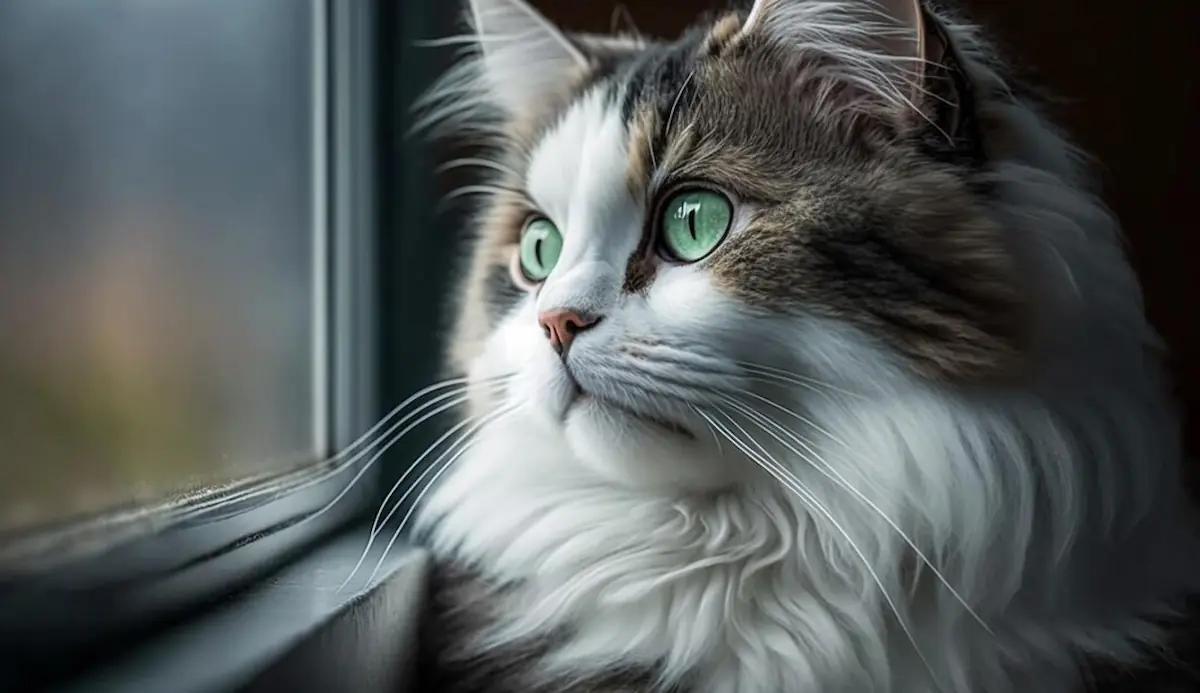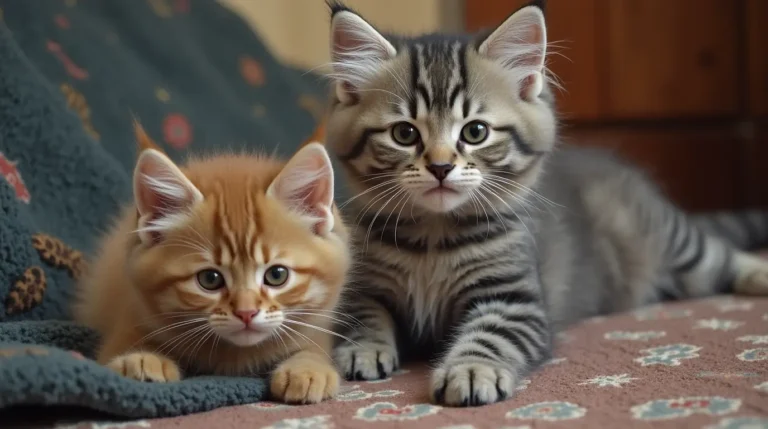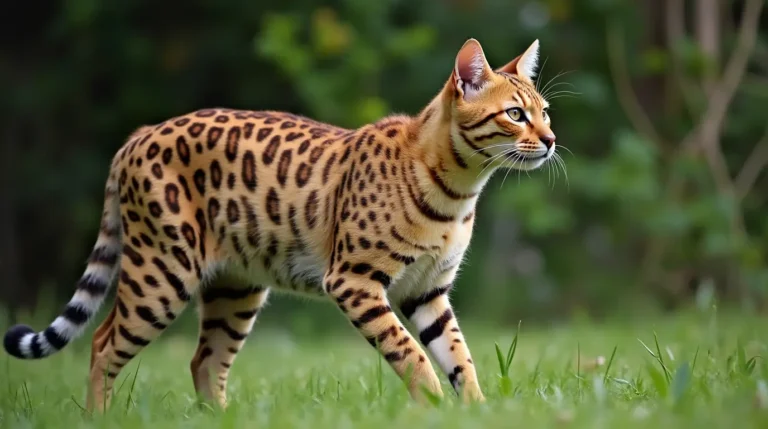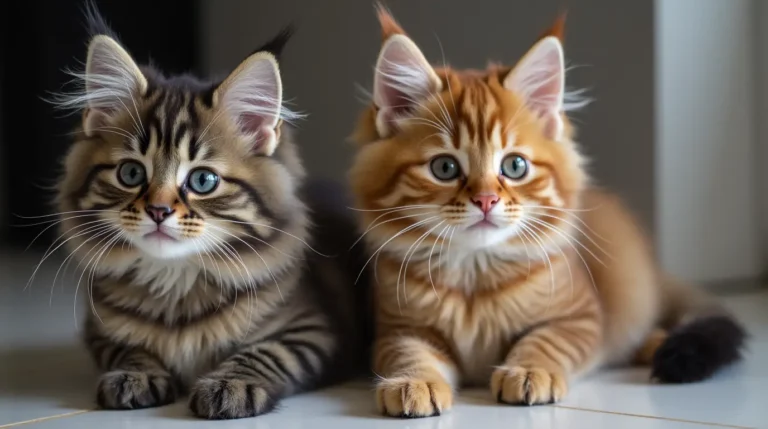Are Maine Coon Cats Hypoallergenic? The Truth Revealed
If you love cats but have allergies, you might wonder: are Maine Coon cats hypoallergenic? The simple answer is no. Maine Coons can be tough for people with allergies because of their dander, saliva, and urine. But, what makes them so bad for people with allergies, and are there ways for Maine Coon owners to cope?

Key Takeaways:
- Maine Coon cats are not hypoallergenic due to the proteins in their skin, urine, and saliva that can trigger allergic reactions.
- All cats, including Maine Coons, have the potential to cause allergies, though some breeds are less likely to trigger reactions.
- Symptoms of cat allergies can range from sneezing and watery eyes to more severe reactions like hives and difficulty breathing.
- Regular grooming, limiting contact, and creating allergen-free zones can help minimize allergies for Maine Coon owners.
- Consulting a doctor for allergy medication may also be an effective solution for managing life with a Maine Coon.
Understanding Cat Allergies and Hypoallergenic Breeds
Many people love cats but face challenges with allergies. Luckily, some cat breeds are better for those with allergies. But what makes a cat hypoallergenic, and which breeds are best?
What Makes a Cat Hypoallergenic?
Hypoallergenic cats produce fewer allergens or shed less. The main allergen is Fel d 1, found in a cat’s saliva, skin, and urine. Some breeds have less of this protein, making them better for allergy sufferers.
Common Cat Allergens
There are over 10 proteins in cats that can cause allergies. These include Fel d 2, Fel d 4, and Fel d 7. How severe a reaction is can depend on the person’s sensitivity to these allergens.
Popular Hypoallergenic Cat Breeds
- Siberian
- Balinese
- Bengal
- Cornish Rex
- Devon Rex
- Oriental
- Russian Blue
- Sphynx
These breeds are known to have fewer allergens or shed less. This can help reduce allergy reactions. But remember, no cat is 100% hypoallergenic, and reactions can vary.
“Roughly 5 to 20 percent of the world’s population suffers from cat-related allergies, with the majority of these individuals being allergic to the Fel d 1 protein.”
Maine Coon Physical Characteristics
Maine Coon cats are known for their impressive size and distinct physical features. They are one of the largest domesticated cat breeds.
Male Maine Coons can weigh between 13 to 18 pounds on average, with some reaching over 20 pounds. These cats can grow up to 40 inches from nose to tail, making them giants among cats.
Related: Maine Coon Cats: A Guide to Their Care, Traits & Personality
Maine Coons have long, glossy, and water-resistant coats in 64 different colors and patterns. Their coats change with the seasons, getting fuller in winter and shedding more in warmer months.
They have large, tufted paws and ears, long bushy tails, and expressive eyes, often in shades of gold or green. These features, along with their rectangular body, give them a regal look.
Maine Coons are known for their friendly and sociable nature. They are popular pets for families. They typically reach full maturity between 3 to 5 years of age, slower than many other cat breeds.
| Characteristic | Details |
|---|---|
| Size | Male Maine Coons weigh 13-18 pounds on average, with some exceeding 20 pounds Females weigh 9-13 pounds They can measure up to 40 inches from nose to tail, making them one of the largest domestic cat breeds |
| Coat | Long, glossy, and water-resistant coat Coat adapts to seasons, becoming fuller in winter and shedding more in warmer months Available in 64 different colors and patterns |
| Distinctive Features | Large, tufted paws and ears Long, bushy tail Expressive eyes, often gold or green Rectangular body structure |
| Maturity | Reach full maturity between 3-5 years of age, slower than other cat breeds |
Maine Coon cats are loved worldwide for their size, striking features, and gentle nature. They make wonderful companions.
Are Maine Coons Hypoallergenic?
Maine Coon cats are not hypoallergenic. They are loved for their looks and friendly nature. But, their thick fur can make some people allergic.
Why Maine Coons Trigger Allergies
Maine Coons, like all cats, have a protein called Fel d 1. This protein is in their skin, saliva, and urine. It gets spread through their fur as they shed.
Their long coats trap more of these allergens. This can make allergy symptoms worse.
Female vs. Male Maine Coon Allergen Production
Some studies say female Maine Coons might make less Fel d 1. But, the difference is small. Both males and females can cause allergies.
Shedding Patterns and Allergen Spread
Maine Coons shed all year, more in seasonal changes. Their fur spreads allergens far. But, their fur’s thickness can keep some dander close to the skin.
In conclusion, Maine Coon cats are not hypoallergenic. Their Fel d 1 protein and shedding can cause allergies.
Some with mild allergies might do okay. But, those with severe reactions might need to look into other breeds or medical help.
Related: Royal Canin Maine Coon: Premium Cat Food for Giants
Common Allergy Symptoms from Maine Coons
Having a Maine Coon cat can be wonderful, but it can also cause allergies. No cat breed is completely hypoallergenic. However, reactions to Maine Coons can differ a lot from person to person.
The usual cat allergy symptoms from Maine Coons include sneezing and a runny nose.
You might also have itchy, watery eyes, cough, wheeze, and shortness of breath. Some people get skin rashes or hives too. These Maine coon allergy reactions can be mild or very bad and get worse over time.
Allergies in cats usually come from proteins in their saliva, skin cells (dander), and urine. Some Maine Coons may have more of these proteins than others.
This means some cats might be better for people with allergies. Keeping your home clean and grooming your cat regularly can help lower allergen levels.
| Common Cat Allergens | Typical Allergy Symptoms |
|---|---|
| Fel d 1, Fel d 4 | Sneezing Runny nose Itchy, red, or watery eyes Coughing Wheezing Skin rashes or hives |

If you keep getting cat allergy symptoms from a Maine Coon, see a doctor. They can help you figure out how to manage your allergies. They might suggest medicines or treatments that can make you less sensitive over time.
Managing Life with a Maine Coon Despite Allergies
Having a Maine Coon cat can be very rewarding, but it can also be challenging for those with allergies. Luckily, there are ways to take care of your Maine Coon and keep your home clean.
Regular grooming and cleaning are crucial to reduce allergens and make your home more comfortable.
Grooming and Cleaning Tips
Brush your Maine Coon every week to get rid of loose hair and dander. Use a hypoallergenic shampoo to bathe your cat every few months. This keeps their coat clean and reduces allergens.
Vacuum often with a HEPA-filtered vacuum to catch pet dander and allergens. Also, wash your cat’s bedding in hot water regularly.
Creating Allergen-Free Zones
Make some areas of your home, like the bedroom, cat-free zones. This helps reduce allergen exposure while you sleep. Use HEPA air purifiers in these areas to keep the air clean.
Air Quality Management
Good air quality is key to managing Maine Coon allergies. Use HEPA air purifiers and make sure your home is well-ventilated. Also, consider using dehumidifiers to keep the air dry, as moisture can make allergies worse.
By following these tips, you can manage your allergies and enjoy your Maine Coon’s company. Remember, every cat is different, so watch how your cat reacts and adjust your care routine as needed.
Related: Why Are Maine Coon Cats So Big? Discover the Secrets Behind Their Massive Size
Medical Solutions for Maine Coon Allergies
If you love Maine Coons but have allergies, there’s hope. Many medical options can help you manage your allergies.
You can find relief with over-the-counter meds or special treatments. This way, you can still enjoy your Maine Coon’s company.
For mild to moderate symptoms, over-the-counter meds like antihistamines and decongestants can help. But, if your symptoms are severe, you might need prescription meds. Your doctor will suggest the best treatment for you.
Sublingual immunotherapy (SLIT), or “allergy drops,” is a promising option. You put a small amount of cat allergen under your tongue.
This can help your body get used to the allergen and reduce your reactions. Your doctor will check on your progress and adjust your treatment as needed.
| Treatment Option | Description |
|---|---|
| Antihistamines | Over-the-counter medications that block the histamine response and reduce allergy symptoms |
| Decongestants | Help relieve nasal congestion and sinus pressure |
| Nasal Corticosteroids | Prescription sprays that reduce inflammation in the nasal passages |
| Sublingual Immunotherapy (SLIT) | Allergy drops placed under the tongue to build immunity over time |
It’s crucial to talk to an allergist or immunologist to get a treatment plan that fits you. With the right treatment, you can manage your Maine Coon allergies. This way, you can keep enjoying their company.
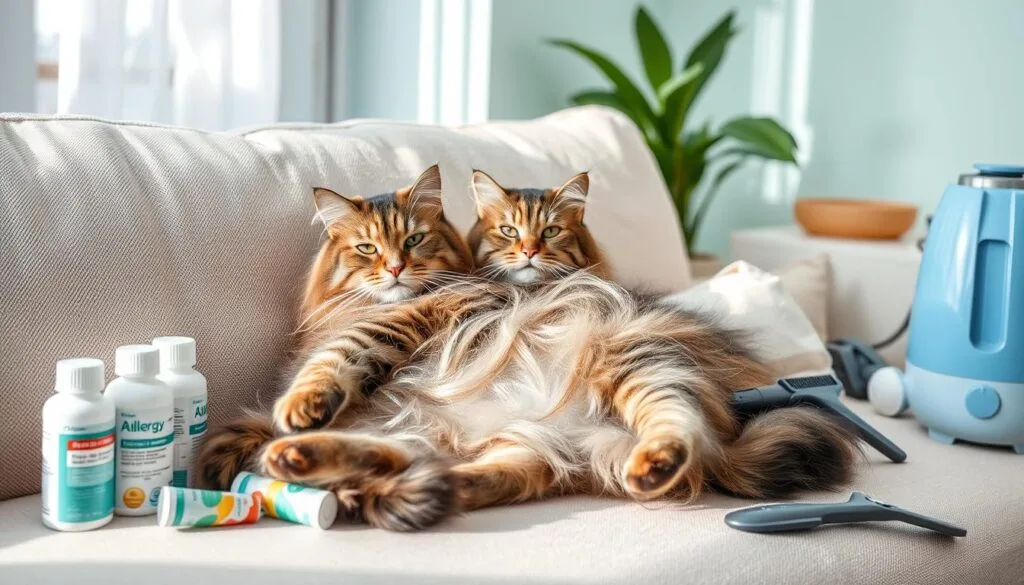
Alternatives to Maine Coons for Allergy Sufferers
If you love Maine Coons but have allergies, don’t worry. There are other cat breeds that might be better for you.
These cats may not be 100% hypoallergenic, but they produce fewer allergens or shed less. Let’s look at some options that could work for you.
Similar Cat Breeds with Lower Allergen Levels
- Siberian cats make less Fel d 1 protein, the main cat allergen.
- Balinese cats have lower allergen levels, making them good for those with allergies.
- Bengal cats have short, sleek coats that shed less, reducing allergen exposure.
- Cornish Rex and Devon Rex breeds have unique coats that shed and dander less.
- Oriental and Russian Blue cats shed less, which can help with allergies.
- Sphynx cats, although they have dander, can be manageable for some with regular grooming.
Breed Comparison Guide
| Breed | Allergen Production | Shedding Level | Grooming Needs |
|---|---|---|---|
| Siberian | Low | Moderate | Moderate |
| Balinese | Low | Low | Moderate |
| Bengal | Moderate | Low | Low |
| Cornish Rex | Low | Low | Low |
| Devon Rex | Low | Low | Low |
| Oriental | Moderate | Low | Moderate |
| Russian Blue | Moderate | Low | Moderate |
| Sphynx | Moderate | Low | High |
When looking for a Maine Coon alternative, think about the cat’s personality, grooming needs, and care requirements. This will help you find the best fit for your lifestyle and allergies.
Related: Why the Black Maine Coon Cat is the Perfect Pet for You
Best Practices for Maine Coon Care
Owning a Maine Coon cat requires special care to keep them healthy and happy. Their long, beautiful coats need regular grooming.
Brushing them weekly helps manage shedding and prevents matting.
It’s also important to feed them a balanced diet. Maine Coons need a diet that matches their size and age. A raw diet with the right mix of protein, fat, and carbs is best. Regular vet visits are crucial, as Maine Coons can get certain health problems.
Don’t forget about their dental and nail care. Keeping their teeth and nails clean is key. Also, give them lots of toys and places to explore. This keeps them active and happy.
“Proper care and attention to a Maine Coon’s unique needs can help ensure a long, healthy, and happy life for these majestic cats.”
By following these care tips, you can make your Maine Coon very happy. They will thrive in your home with the right love and care.
| Maine Coon Care Aspect | Best Practices |
|---|---|
| Grooming | Weekly brushing, annual baths |
| Diet | A raw diet with an 80-10-10 ratio |
| Veterinary Care | Regular check-ups, monitoring for breed-specific health issues |
| Dental and Nail Hygiene | Monthly nail trims, dental care |
| Enrichment | Engaging toys, environmental stimulation |
Conclusion
Maine Coons are not hypoallergenic, but many people with allergies can still live with them. Proper care, cleaning, and medical help are key.
If you have pet allergies, think carefully before getting a Maine Coon. Always talk to health experts first.
With the right steps, like regular grooming and air filters, you can enjoy a Maine Coon’s company.
Knowing how to manage allergens helps create a happy home for both you and your cat. This way, you can love Maine Coons without worrying too much about allergies.
Deciding to get a Maine Coon should be a thoughtful choice. You need to consider your allergies and be ready to keep your home clean.
With the right steps, owning a Maine Coon can be a wonderful experience, even for those with allergies.
Related: Maine Coon Cat Price: Why This Majestic Breed Can Be Expensive
FAQ
Are Maine Coon cats hypoallergenic?
No, Maine Coon cats are not hypoallergenic. They have allergens in their saliva, skin cells (dander), and urine. This can cause allergic reactions in some people.
What makes a cat hypoallergenic?
Hypoallergenic cats make fewer allergens or shed less. The main allergens are Fel d 1 and Fel d 4 proteins. These are found in their saliva, skin, and urine.
What are some popular hypoallergenic cat breeds?
Some popular hypoallergenic cat breeds are Siberian, Balinese, and Bengal. Also, Cornish Rex, Devon Rex, Oriental, Russian Blue, and Sphynx. These cats produce fewer allergens or shed less.
What are the physical characteristics of Maine Coons?
Maine Coons are big cats with a rectangular body. They have long, glossy coats that are water-resistant. They come in 75 colors and patterns.
They have big, tufted paws and ears, long tails, and expressive eyes. Their eyes are usually gold or green.
Why are Maine Coons not hypoallergenic?
Maine Coons are not hypoallergenic because of their thick fur. They also produce allergens like Fel d 1 protein. Their long coat spreads allergens widely.
How do allergies to Maine Coons manifest?
Allergic reactions to Maine Coons can include sneezing and a runny nose. Itchy, red, or watery eyes and coughing are also symptoms. Wheezing, shortness of breath, skin rashes, and asthma can also occur.
Symptoms can be mild or severe. They may get worse with more exposure.
How can allergies to Maine Coons be managed?
Regular grooming and bathing can help. Creating allergen-free zones is also important. Using HEPA air purifiers and vacuums helps too.
Washing bedding regularly is key. Over-the-counter and prescription medications can also manage symptoms. Immunotherapy is another option.
What are some alternatives to Maine Coons for allergy sufferers?
For those allergic to Maine Coons, breeds like Siberian, Balinese, and Bengal might be better. Cornish Rex, Devon Rex, Oriental, Russian Blue, and Sphynx are also good options. These cats usually produce fewer allergens or shed less.
What are the best practices for caring for a Maine Coon?
Maine Coons need weekly grooming and a balanced diet. Regular vet visits and dental care are important. They also need their nails trimmed.
Providing mental and physical stimulation is crucial. Play and environmental enrichment keep them happy and healthy.

